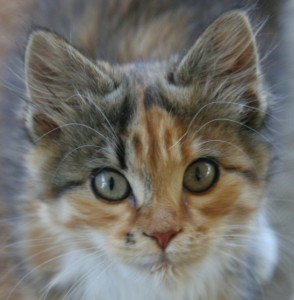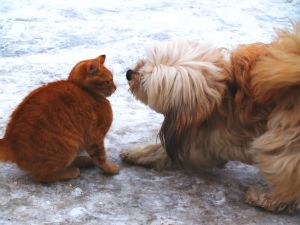Q: My part Himmy cat has PICA. What can I do in addition to removing anything that he will eat? Are there any treatments for this? – Stacey
A: Have you seen a veterinarian or consulted with a behaviorist to determine if your cat has ‘pica?’ There is no formal treatment for ‘pica,’ since pica simply means ingestion of non-food items. Therefore, what your cat is eating, how often he eats it, what he does beforehand, and whether he eats these items in your presence, will help you determine the source of the problem, and then change the behaviors.
A cat can ingest non-food items out of boredom, curiosity and age development, restlessness, possible early weaning, poor diet, restricted feedings, malnutrition, lack of appropriate play or physical activity, or an underlying disease or medical condition, such anemia or intestinal parasites. If your kitty is suckling beds, pillows, or blankets, he was most likely weaned too early. Kittens can nurse or try to nurse up to 6 months of age. However, kitties who suckle fabric or blankets tend not to ingest these items.
Sometimes cats can show an interest in cords or rubber and soft plastic items. Some cats may be drawn to these items due to texture or novelty – they’re fun to chew — especially for young cats. Many plastics and cords are made with tallow or gelatin, and it has been suggested that cats may be attracted to plastic for this reason. If your kitty is selecting dirt, grass, pebbles, or sand, he may need more roughage in his diet and/or a change of food. You can grow some feline edible plants, including grasses, for your kitty to eat. Some kitties like eating veggies and corn on the cob. If your cat is eating clay, your cat may have a nutritional deficiency, may not be feeling well, and/or may have an underlying medical condition. It is important to take your kitty to the veterinarian, if you suspect your cat’s ingestion of non-food based items is out of control or abnormal.
Q: My 8 yr old is peeing indoors. She uses a cat flap and is free to go in and out as she pleases. I know WHY she does this – she has a bad relationship with our dog – but how do I stop it? The dog is very barky and will chase her if I am around, he leaves her alone if I am not around. The cat tends to spend most of her time in my daughter’s bedroom where the dog is not allowed. The cat tends to pee mostly on the carpet at the top of the stairs, but will also go in the dining room if we have left the door open. I assume she does all this because of anxiety about the dog, however she doesn’t outwardly appear anxious. In fact she seems to try to torment him by sitting close and washing herself. She will also walk past him and then back again as if to annoy him. – Kay
A: If you don’t have a litter box indoors, this will be a source of your problem. Please read Introducing Dogs to Cats to help you. Your cat is either having a problem with the litter box arrangement and/or the dog is blocking or restricting your kitty’s access to litter boxes. If you have a litter pan in the basement for instance, or in a corner, she can be trapped by the dog or be suddenly charged or chased. If she is going in a location where there is a good peripheral or landscape view of the area, this can indicate that the locations the litter boxes are in, or the litter boxes themselves (i.e., covered, not open), make her feel more vulnerable (Read How to Resolve a Litter Box Problem). If your cat has to pass through a cat flap in order to access a litter box or exit and enter the house, then she cannot see where the dog is as she does so which makes her vulnerable to being chased. You also may be reinforcing nudgy/pushy behavior with your dog to get your attention, since you mentioned the behaviors occur when you are present. Rewarding pushy, first come first serve behavior, instead of manners, can make dogs in a household aggressive to one another. Your dog can be behaving similarly to your cat – see Living with More Than One Dog.
Your dog may be antagonizing your kitty more often when you are around because your cat comes to greet you too when you come home or are present. When you are away, you mentioned your kitty stays in the bedroom or upstairs so there is no reason for your dog to chase her.
Copyright © Alana Stevenson 2013
Alana Stevenson can be contacted through her website AlanaStevenson.com. She provides consultations by phone & Skype.

